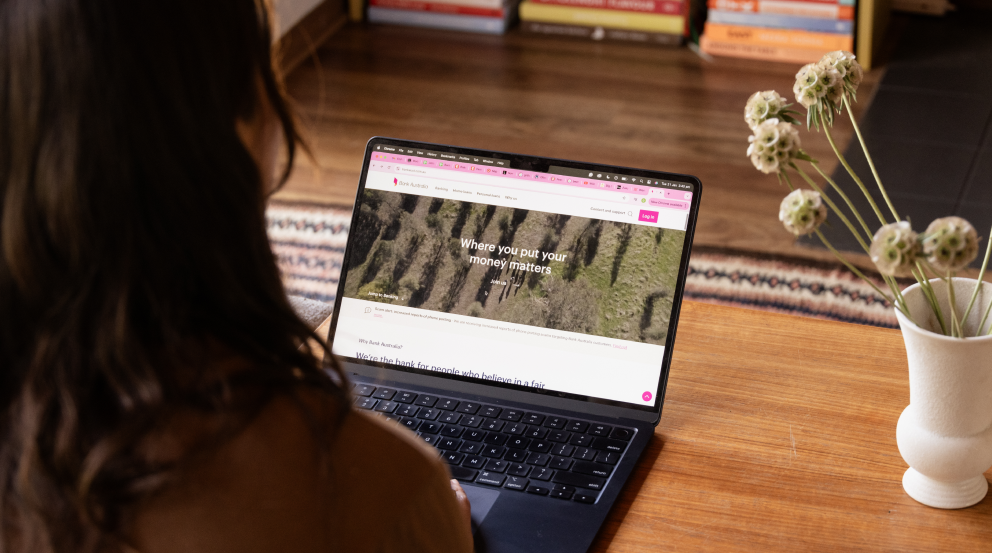If your place is freezing cold in winter and swelteringly hot in summer, it might be time to re-energise your home. Energy assessor and Bank Australia customer, Lucinda Flynn, shares energy efficiency tips and some simple changes you can make now.
Lucinda Flynn has been working in the sustainability industry for 15 years and has been an energy assessor for the last eight. This involves going into people’s homes, looking at the age of the house, how it’s been built, and what appliances are used to help determine what’s using the most energy and how they can potentially use less.
“My role isn’t about telling you to put on another jumper,” Lucinda laughs, who’s part of the team at Going Green Solutions. “It’s about rearranging how things work and being more clever about using energy.”
Part of Lucinda’s role includes helping people keen to apply for Bank Australia’s Clean Energy Home Loan.
“People want to feel good about energy-efficient changes they’re making to their homes,” she says. “It’s nice to have that acknowledgment in an official way.”
Here are Lucinda’s top tips for how to make your home more energy efficient.
1. Re-zone your home
Closing off different areas of your home can be a really effective way to reduce the energy load needed to keep yourself comfortable.
“One benefit of older homes is that they tend to have doors separating rooms and spaces, so you can heat or cool one room by closing a door, without heating and cooling the whole house,” Lucinda explains.

2. Seal the deal – aka draughts
Sealing up draughts is a simple tip to make your home more energy efficient and comfortable, but it's often overlooked.
“You could have a super-efficient heater, but if there are massive draughts in the house, you’re just heating the air multiple times an hour,” Lucinda says.
To avoid this, seal up wall vents with plaster, put plugs in open chimneys, seal around windows, and install a brush or roller on the bottom of doors to keep the heat in and the chill out.

3. Insulate the ceiling, walls and floor
Ceiling insulation provides a thermal barrier in your home and will make both summer and winter months a lot more comfortable. “It’s relatively inexpensive and is well worth getting done,” says Lucinda.
Wall insulation is particularly good for weatherboard houses, and is done by blowing the insulation through small holes in the walls. “It’s a bit like putting a jumper on your house,” Lucinda explains.
If your house is raised and has timber floorboards, under-floor insulation is an important consideration for energy efficiency too.
4. To double glaze windows, or not to double glaze?
Many people think that double-glazing is the only way to insulate your windows but this isn’t necessarily the case. It can be fantastic if your budget allows but it can be pricey. Instead, consider secondary glazing, which is adding another layer – often acrylic – to the glass, without removing the whole window frame.
Installing a heavy-lined curtain (with a pelmet) can be just as efficient as glazing and is a great way to keep the heat in.
Think about putting some external shading over your windows to keep the heat out in summer, too.

5. The heat is on (or off)
The most energy efficient way to heat and cool your home is with a reverse-cycle air conditioner. Two or three units installed in the main zones in your house, instead of central ducted heating, can reduce your energy usage in a big way.
The most cost-efficient heating temperature in winter is between 18 and 20 degrees; aim for between 20 and 24 degrees for cooling in summer. Each degree above or below that you set the thermostat can add 10% to your cooling or heating costs.
“You should still feel like it’s summer in summer and winter in winter,” Lucinda says, “But just not uncomfortable.”
6. Let’s get personal – with your own little heater
What’s one of the best ways to keep warm in winter? A good ol’ fashioned hot water bottle. These days, you can also invest in things like heated throws and seat pads too.
“It might sound daggy, but if I’m sitting on my heat pad, I don’t need any other heating in the room,” Lucinda says. “They’re cheap to buy and really cheap to run.”
Find out more about having an energy assessment at your place or read up on our Clean Energy Home Loan now.
More home energy efficiency tips and information
- Understand the ‘why’: 7 reasons why you should make your home more energy efficient
- Go electric: How to switch from gas to electric at home
- Don’t own? Explore how to be energy efficient when you rent
.webp)




.png)


